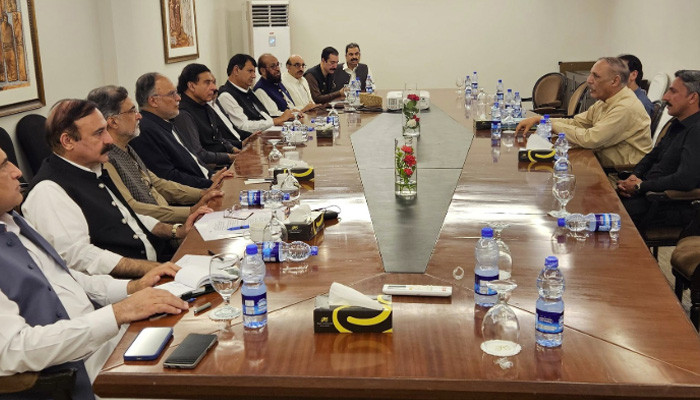Talks Resume Between JKAAC and Government Team
In Muzaffarabad, formal discussions have recommenced between the Jammu Kashmir Awami Action Committee (JKAAC) and a government-appointed negotiating body.
The second phase of discussions began shortly after Friday prayers, with a delegation dispatched on the instructions of Prime Minister Shehbaz Sharif meeting with representatives from the public action committee.
The action committee has been orchestrating demonstrations in Azad Jammu and Kashmir (AJK). These protests escalated into violence, resulting in at least nine fatalities, including three police officers, and injuries to over 100 individuals.
The area is currently experiencing a widespread shutdown and transport strike, punctuated by sporadic clashes between law enforcement and activists in Muzaffarabad, the state capital.
The JKAAC had presented a comprehensive list of demands, comprising 38 points. These included abolishing 12 reserved seats for refugees and eliminating “privileges enjoyed by the elite”.
Government representatives present at the meeting were Federal Ministers Tariq Fazal Chaudhry, Amir Muqam, and Ahsan Iqbal, along with Raja Pervez Ashraf, Qamar Zaman Kaira, Rana Sanaullah, and others.
Key figures from the action committee, such as Sardar Masood Khan and Sardar Yousaf, participated in the dialogues.
Action committee participants requested the restoration of internet access, and authorities indicated that final deliberations on the remaining demands would occur during the course of the negotiations.
Federal Minister for Parliamentary Affairs Chaudhry affirmed complete backing for the rights of the Kashmiri populace, stating that the majority of demands deemed beneficial to the public have already been approved.
He specified that a limited number of pending requests necessitate constitutional changes and, therefore, require further examination.
Chaudhry underscored that violence offers no resolution and conveyed optimism that the action committee would peacefully resolve the outstanding concerns through discussion.
Law Minister Azam Nazeer Tarrar addressed the legal and constitutional aspects pertinent to the negotiations.
He clarified that voters in the 12 AJK constituencies are originally from Kashmir, that their link to Kashmir remains despite relocation, and that any adjustments should not suddenly sever these links.
He highlighted the necessity of a thorough constitutional framework and extensive political agreement involving all Kashmiri leaders.
Tarrar advised against hasty decisions on constitutional revisions and core rights, mentioning numerous legal complexities and possible societal and political repercussions.
He remarked that the Kashmir constitution lacks a provision for a referendum, asserting that hurried actions could be detrimental to the Kashmir cause.



Comments (0)
No comments yet. Be the first to comment!
Leave a Comment